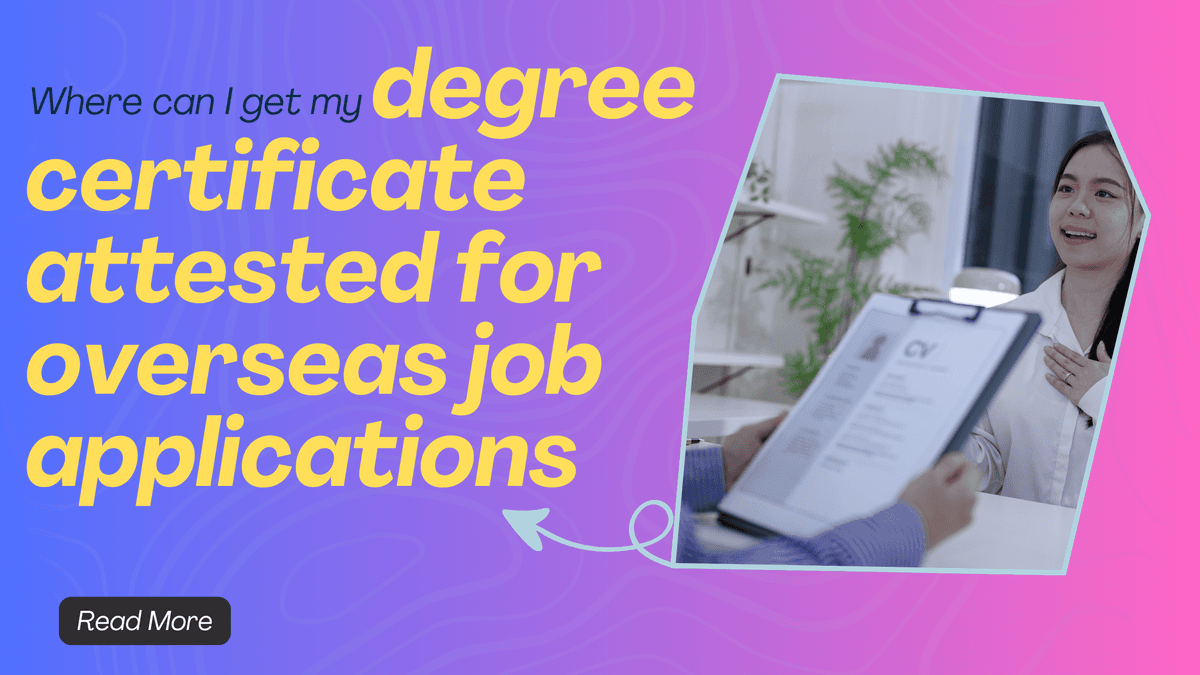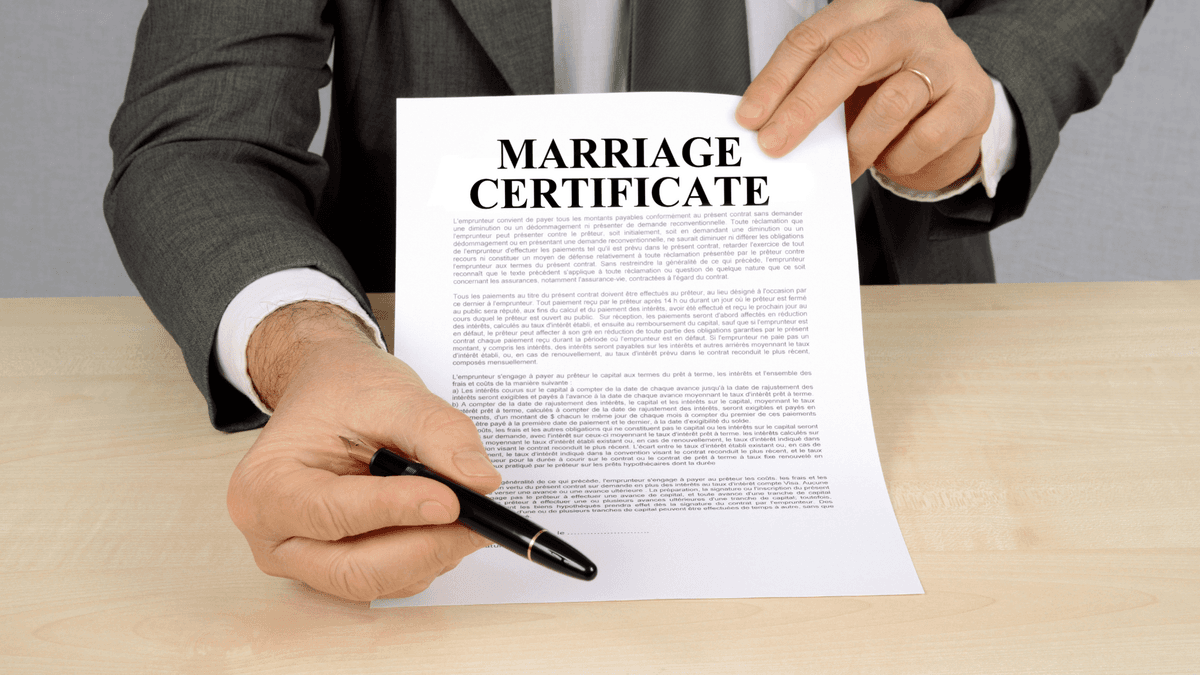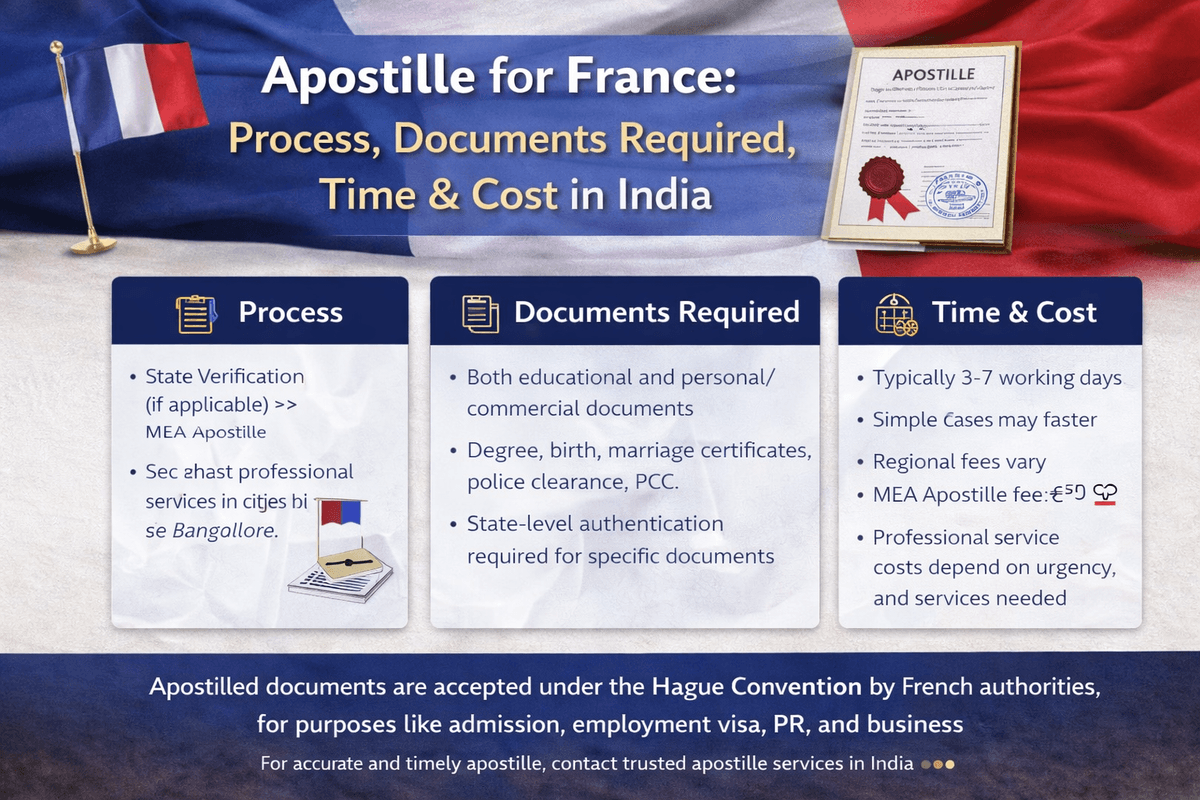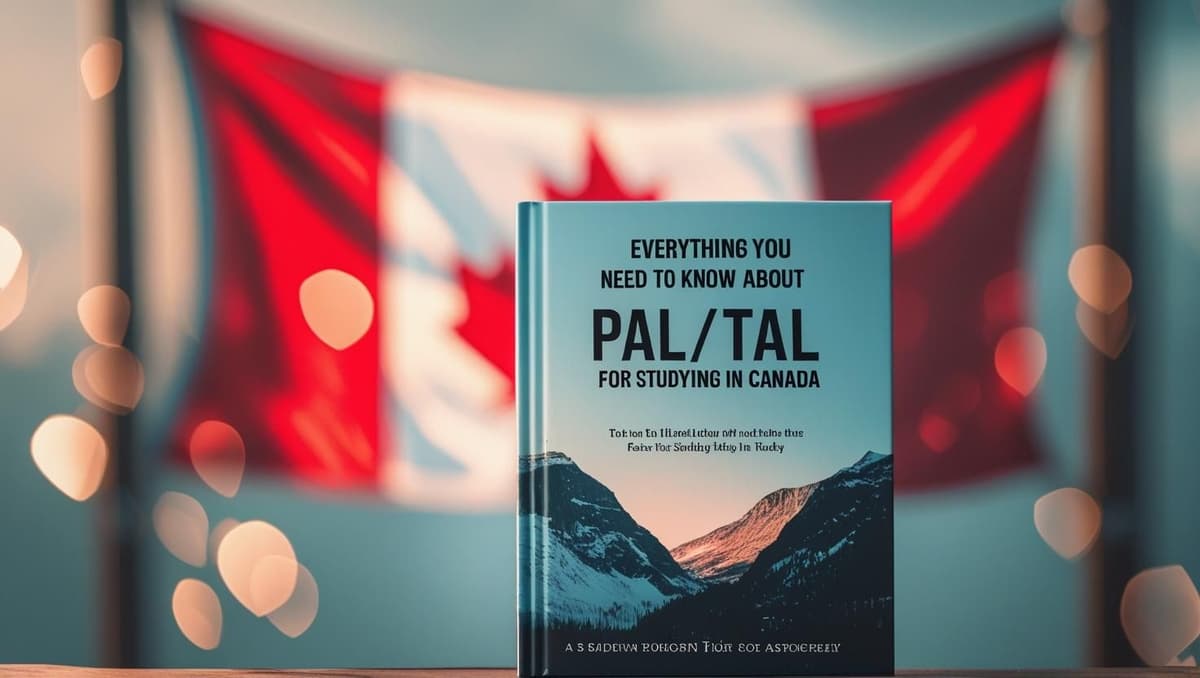
Where can I get my degree certificate attested for overseas job applications?
A practical, guide with step-by-step instructions, local & online options, real timelines, examples, cost guidance, common pitfalls, and authoritative references so you can get your degree attested quickly and correctly for job applications abroad.
Quick summary
If you need your degree certificate attested for overseas employment, the fastest reliable options are:
- MEA Apostille (for Hague-Convention countries) via MEA-authorized outsource partners.
- State / HRD (University) verification → MEA → Embassy legalization (for non-Hague countries such as many GCC states).
- Use a reputable apostille/attestation agency (door-to-door pickup, pre-checks, tracking) to avoid repeated trips and delays.
Plan for 3 days–8+ weeks depending on country and whether your degree needs university/HRD verification. See timelines below for examples.
Why does an employer abroad ask for an attested degree certificate?
Employers, licensing bodies, and immigration authorities need assurance of authenticity — attestation or apostille confirms the document was legitimately issued by an authorised Indian institution and has been certified by competent Indian authorities for use overseas. Common reasons employers request attested degrees:
- To verify educational qualifications for hiring and salary banding.
- For work permit / visa compliance (immigration needs verified credentials).
- When the employer must register you with a professional body (e.g., nursing, engineering).
- For background checks and compliance with corporate governance.
Because procedures and requirements vary widely by destination country, always confirm the exact attestation route requested by your employer or the receiving authority.
Two main legalization routes — which one applies to you?
- Apostille (MEA) — For countries that are parties to the Hague Apostille Convention. India issues an apostille sticker or stamp via the Ministry of External Affairs (MEA). Examples: Germany, France, Italy, Australia, Netherlands, Japan, South Korea, Canada (some uses), New Zealand, etc.
- Consular / Embassy Legalization — For non-Hague countries (many Gulf states, some others), documents often need a chain like: Notary/State/University → MEA → Embassy/Consulate of destination → MOFA (destination country, sometimes after arrival). This is longer and may involve additional fees and embassy appointments.
How to check: Ask your employer or the visa/HR team which exact stamps they expect. If unsure, ask them to confirm: “Do you require a Hague Apostille or embassy legalization for India?”
Who can attest your degree certificate in India? (Trusted options)
- MEA-authorised outsource agencies / service centres — official, fastest route for MEA apostille and central attestation. Use MEA’s apostille/attestation page to confirm authorized partners.
- State HRD / University verification offices — if your degree requires state/university attestation (many Indian universities require HRD verification before MEA). Contact your university’s examination/verification cell or the State HRD.
- Notary public / District / Sub-Registrar — for initial signature certification or police verification in some cases.
- Embassy / Consulate — for non-Hague legalization steps (often handled by agencies on your behalf).
- Professional attestation agencies — private firms that coordinate the full chain: notary → HRD/university → MEA → embassy and courier back to you (recommended when you need speed and hand-holding).
Tip: Use MEA-listed agencies or those with verifiable MEA routing to avoid scams.
Step-by-step: How to get your degree certificate attested for an overseas job
- Confirm destination requirements — Apostille or embassy legalization? Also check whether originals, notarized copy, or certified true copy is required.
- Gather documents — Original degree certificate, consolidated marksheet, provisional certificate (if applicable), passport copy, and employer/immigration checklist.
- Pre-checks — Ensure certificates are unlaminated and signatures/serial numbers are clear. Many authorities reject laminated documents.
- University / HRD verification (if required) — The issuing university/state education department may need to confirm the document’s authenticity. This is common for many degree verifications.
- Notary / local attestation (if asked) — Some embassies ask for notarized copies before MEA submission.
- MEA apostille / attestation — For Hague countries, MEA issues an apostille after receiving documents (directly or via authorized agency). For non-Hague, MEA may still be part of the chain before embassy legalization.
- Embassy / Consular legalization (if required).
- Courier back — Receive your attested documents and submit to your employer or visa office.
Realistic timelines — fast, average, and slow cases
- Fast (Apostille only; no university verification): 1–7 working days if you use an MEA-authorised agency and the MEA workload allows expedited processing. Some agencies advertise 24–72 hour MEA slots for simple cases.
- Average (University/HRD verification required): 2–6 weeks — university responses and state verifications add time.
- Slow / Complex (Embassy legalization, MOFA, or multi-department verifications): 3–8+ weeks depending on embassy wait times, additional certifications, and country-specific steps.
Typical costs (ballpark)
Costs vary by provider, urgency, and number of documents. Typical ranges per document in India (indicative):
- Notary: ₹50–₹500
- University/HRD verification: ₹500–₹3,000 (depends on university/state)
- MEA apostille fee + agency handling: ₹1,000–₹5,000 (service fees vary)
- Embassy/legalization: ₹2,000–₹20,000 (varies widely by embassy and urgency)
- Doorstep pickup & insured courier: additional ₹200–₹1,000
Always request a written fee breakup showing government fees vs agency service charges to avoid surprises.
Country examples — what they usually ask (practical)
- Germany / France / Italy (Hague members): Apostille from MEA generally sufficient for degree certificates (but check if translations are needed).
- UAE / Saudi / Qatar / Kuwait / Oman (GCC): Often require notary → state/HRD → MEA → embassy (or MOFA); translations to Arabic and MOFA after arrival may be needed. These routes take longer.
- Australia / New Zealand: Apostille accepted; some employers or licensing boards may ask for additional verifications or certified translations.
Example scenario: You have a BE degree and a job offer in Germany — employer asks for an apostilled degree and an English/German translation. You submit originals to an MEA-authorised agency for apostille and arrange a certified translation provider.
Where to get attestation in major Indian cities (options)?
- Online / National MEA-authorized agencies — many agencies operate nationwide with local pickup in metros. MEA publishes information on outsource partners (use MEA site to verify).
- Local attestation offices / VFS / Outsource centres — some cities have regional processing counters and partner centres.
- University verification cell — contact the issuing university’s verification or examination department (especially for older degrees).
- Notary / District courts — for notarization.
- Professional attestation/translation firms — for combined services (apostille + translation + embassy).
Why using an MEA-authorised agency is often fastest?
- MEA allows authorized outsource service providers to collect and deposit documents, which reduces the need for applicants to physically visit MEA offices and speeds up logistics. Agencies manage pre-checks, de-lamination, and follow the correct routing to avoid rejections. Always confirm the agency uses official MEA channels.
Indian context & demand — why attestation services are growing
- Large student & professional mobility: India continues to have large numbers of people travelling for study and work. MEA destination statistics and government reports show consistent flows of students and professionals abroad (see MEA destination data).
- Remittances & global connections: India received record remittances (e.g., ~US$135.46 billion in FY24/25 per RBI reporting), reflecting strong overseas employment and business ties that require verified documents. Reliable attestation enables these cross-border activities.
- Digital initiatives: MEA’s eSanad and other digital efforts aim to make verification and attestation more contactless and paperless, helping NRIs and applicants in future.
Common pitfalls & how to avoid them
- Laminated certificates: MEA/embassies often reject laminated originals. Keep unlaminated originals.
- Missing university verification: Many Indian universities require formal verification; skip this at your peril — employers or MEA may ask for HRD verification first.
- Wrong attestation route: Apostille vs embassy legalization confusion wastes time; always confirm with employer/immigration.
- Using unknown agencies: Use MEA-listed or well-reviewed providers — check Google reviews and request proof they use MEA outsource channels.
Practical checklist before submission (copy & use)
- Originals: Degree certificate + consolidated marksheets (unlaminated).
- Passport copy (personal ID).
- Employer / visa authority attestation checklist (what exactly they want).
- University verification (if required) — contact university verification cell.
- Confirm whether translation is needed and source for certified translation.
- Select MEA-authorised agency (if apostille) or embassy-specialist agency (if non-Hague).
- Get a written timeline & fee breakup; ask for tracking & SLA.
- Courier insurance for return of originals.
FAQs
Q: Can I apostille my degree myself at MEA?
A: MEA typically accepts documents via authorized outsource agencies; direct public walk-in to MEA is not the fastest route. Use MEA’s guidance and authorized channels.
Q: How long is an apostille valid?
A: Apostille itself does not carry a formal “expiry” stamp, but receiving authorities or employers may require recently attested documents (e.g., within 3–12 months). Confirm with the employer/authority.
Q: Do employers accept scanned copies of attested degrees?
A: Many employers initially accept scanned copies for screening but may require physical attested originals for final hire or visa processing.
Q: Does WES or other credential evaluators need apostille?
A: Credential evaluators (WES, IQAS, etc.) have specific requirements — often they request certified copies or direct university verification. For WES, university verification and sealed transcripts are commonly needed; check the evaluator’s instructions.
How to choose the right attestation provider (quick guide)
- Verify MEA listing or clear MEA routing.
- Check country-specific experience (GCC vs EU expertise).
- Ask for SLA & written timeline for each stage (university → MEA → embassy).
- Look for doorstep pickup, insured courier & tracking.
- Read recent customer reviews (last 6 months).
- Confirm transparent pricing (govt fees vs agency charges).
plan early, choose wisely
Getting your degree certificate attested for overseas job applications is essential—and the time it takes depends largely on the destination country and whether your degree needs university/HRD verification. For Hague countries, MEA apostille via authorised agencies is usually the most efficient and reliable route. For non-Hague countries, anticipate longer timelines because embassy/legalization steps are added. Use MEA-listed partners, confirm exact employer/immigration requirements, and follow the checklist above to avoid delays.
- All
- Apostille
- Attestation
- Australia Apostille
- Austria Apostille
- Bahrain Attestation
- China Attestation
- Egypt Attestation
- France Apostille
- Germany Apostille
- HRD
- Italy Apostille
- Kuwait Attestation
- Lithuania Apostille
- MEA
- Malaysia Attestation
- Mexico Apostille
- Netherlands Apostille
- Nigeria Attestation
- Oman Apostille
- PCC
- Philippines Attestation
- Qatar Attestation
- Saudi Arabia Attestation
- Taiwan Attestation
- Translation
- UAE Attestation
- UK Apostille
- USA Apostille
- Vietnam Attestation
- Visa Stamping




